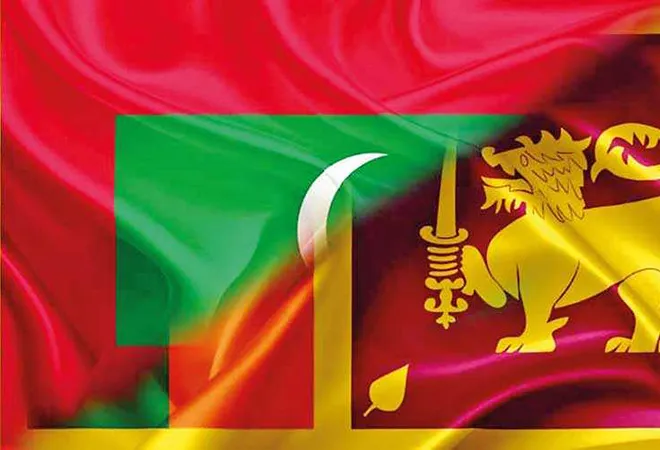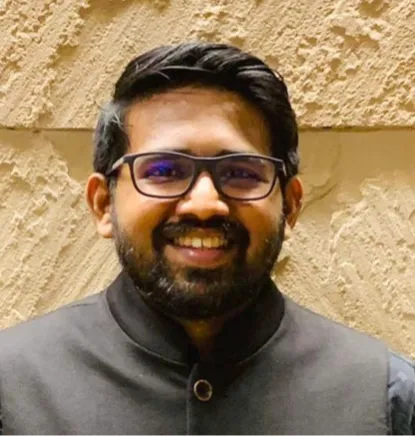
The increasing competition between India and China and the Indo-Pacific’s rising prominence has reinvigorated the world’s interest in the Indian Ocean and its island states; impacting the island states’ behaviour and foreign policy conduct. Subsequently, in 2021, the Maldives has tried reaping benefits from this competition vis-à-vis its ‘India First’ policy. Similarly, Sri Lanka has also continued to save itself from the looming economic disaster by balancing between India and China.
Maldives: Reaping benefits from the competition
In 2021, the Maldives has continued prioritising its ties with India vis-à-vis its ‘India First’ policy. This is in part to woo India and also in part to avoid the Chinese debt trap, especially after the Yameen government borrowed over US $1.5 billion from the former. Nonetheless, it has also tried carving its own strategic space with other major powers, while trying not to aggravate China.
The increasing Chinese debts and India’s willingness to counter it has compelled the Maldives to re-energise its ‘India First’ policy. The momentum of this policy has been carried forward by both the states in 2021. Evidently, the Maldives has permitted India to open up its second mission in the country and has also been amongst the first beneficiaries of India’s vaccine diplomacy.
The increasing Chinese debts and India’s willingness to counter it has compelled the Maldives to re-energise its ‘India First’ policy.
This policy and proximity with India have also provided the island nation with security and disaster response assistance. India has continued patrolling and surveilling the Maldives’ Exclusive Economic Zone through its patrol vessels and aircraft. In 2021, India has also committed to develop, support, and maintain a National Defence Force Coast Guard Harbour in the Maldives’ Uthuru Thila Falhu naval base.
In addition, China’s interest in the Maldives has also helped the island state to attract the much-needed reasonable and sustainable investments from India. By mid-2021, India was working on 45 major development projects worth more than US $2 billion in the Maldives. India also signed the country’s largest infrastructure project—The Greater Malé Connectivity Project, and backed it with a US$ 400 million line of credit and a grant of US$ 100 million. Thus, bringing in the much-needed investments and incentives for the Maldives.
On the other hand, China was on a receiving end this year. The Maldives put some efforts in the bilateral meetings, assured a push for BRI projects, and received COVID vaccines from China, trying not to estrange the former and extract some benefits. Yet, the outcomes remained less tangible. By mid-2021, China had one active project in the Maldives and was only offered an additional energy project in December 2021.
There has also been some understanding within China about its own limitations while competing against the Maldives’ priority for India. China has thus excluded the former from its broader projects in South Asia, as seen with the foreign ministers meeting, China-South Asian Poverty Alleviation and cooperative development and China-South Asia Emergency Supplies Reserve.
The Maldives has tried limiting Chinese influence and debt trapping by interacting with India and other major players.
In addition, the Maldives has also shown its interest in the broader Indo-Pacific developments this year. It plans to promote security in the Indian Ocean alongside India and Sri Lanka with its newly institutionalised trilateral security dialogue. It has also engaged with the US in its first annual security and defence dialogue and is positive to host the US’s first diplomatic mission in the country. Most importantly, the Maldives has also welcomed emergency and financial assistance from the US.
Overall, the Maldives has tried limiting Chinese influence and debt trapping by interacting with India and other major players. Yet, it has also been hesitant to estrange China with the hopes of reaping benefits from the brewing competition in the Indo-Pacific.
Sri Lanka: Improving the art of balancing
In 2021, Sri Lanka has improved its art of balancing between India and China. However, reaping maximum benefits and saving itself from the looming economic disaster has majorly influenced its foreign policy.
The year started with a strong disagreement on the future of the Eastern Container Terminal (ECT). Nation-wide protests and alleged Chinese support had persuaded Sri Lanka to review and unilaterally cancel its ECT project, much to the dismay of its partners—India and Japan. In addition, Sri Lanka also offered a few energy projects of the Jaffna peninsula to a Chinese firm. In mid-2021, the Sri Lankan parliament also passed the Colombo Port City Economic Commercial bill, adding to New Delhi's discomfort. This bill designated the region as a special economic zone and allowed foreigners to participate in the government.
These appeasements to China weren’t free of incentives though. In 2021, besides its forex crisis, Sri Lanka had to repay its outstanding debt of US $4.5 billion. It thus continued depending on China for currency swaps, Foreign Currency Term Financing Facility (FTFF) and grants. It also continued receiving loans, signing new loan agreements, and requesting additional fresh loans from China.
Sri Lanka thus concluded the Western Container Terminal (WCT) agreement with the Adani Group and also requested India’s financial assistance on multiple instances, albeit with less success.
On the other hand, the Sri Lankan government knew quite well that neither they nor the Indian government could afford to abandon each other completely. Sri Lanka thus concluded the Western Container Terminal (WCT) agreement with the Adani Group and also requested India’s financial assistance on multiple instances, albeit with less success. Nonetheless, it continued receiving humanitarian and COVID assistance and investments and lines of credit from India, despite the latter’s unhappiness with Sri Lanka’s pro-China tilt.
However, Sri Lanka’s attempts to woo India gained momentum since late 2021. As Sri Lanka and China’s disagreement over the fertiliser deal intensified, the former requested India for an emergency supply of fertiliser liquid. Usually known for using its China card against India, Sri Lanka changed the balance game by introducing a rare card against China, i.e., the India card.
In the weeks following, Sri Lanka also finalised a financial package with India that was long withheld by the latter due to its unhappiness with the Sri Lankan government. In this new deal, India guaranteed Sri Lanka with currency swaps, energy security, and a line of credit for food and medical imports. In return, Sri Lanka also favoured India by cancelling the Chinese projects in the Jaffna peninsula and offering India to modernise the strategic Trincomalee Tank farm. Thus, indicating that it could even balance China if it wishes to do so.
Conclusion
The changing geopolitics of South Asia and the Indo-Pacific has broadly impacted island states such as the Maldives and Sri Lanka. While both the countries have tried to reap benefits from this competition, it is expected that the competition will intensify in the coming years.
The acquittal of Yameen, increasing advocacy for the India Out campaign, China’s interest in the Maldives, and politicising the presence of Indian technicians, personnel, and officers, indicates that the 2023 general elections in the Maldives are only going to level up this scramble for influence. Similarly, China’s interest and influence in Sri Lanka, its debt-trap diplomacy, and the new objective of entrenching influence in Northern Sri Lanka and the Tamil communities will leave India with little comfort. Overall, the Maldives and Sri Lanka are both heading for a fiercely competitive year in 2022, yet how they would react and balance in the future remains to be seen.
The views expressed above belong to the author(s). ORF research and analyses now available on Telegram! Click here to access our curated content — blogs, longforms and interviews.




 PREV
PREV


